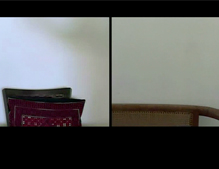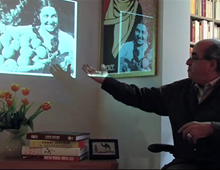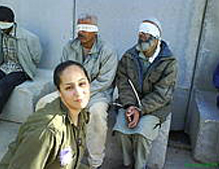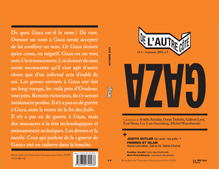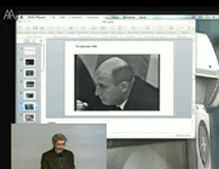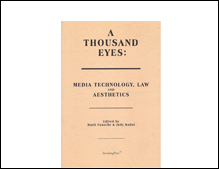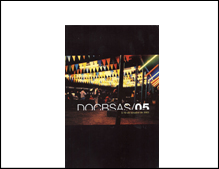-
Proposal for a visual media exhibition
with the participation of students of the Master of Film at the Dutch Film Academy, Amsterdam -
Get my films
Buy DVDs online at www.momento-films.com -
IZKOR
slaves of memory
Documentary film | 1990 | 97 min | color | 16mm | 4:3 | OV Hebrew ST -
Common Archive Palestine 1948
web based cross-reference archive and production platform
www.commonarchives.net/1948 - Project in progress - -
Montage Interdit [forbidden editing]
With professors Ella (Habiba) Shohat and Robert Stam / Berlin Documentary Forum 2 / Haus der Kulturen der Welt / June 2012 -
Route 181
fragments of a journay in Palestine-Israel
Documentary film co-directed with Michel Khleifi | 2003 | 272 min [4.5H] | color | video | 16:9 | OV Arabic, Hebrew ST
-
The Specialist
portrait of a modern criminal
Documentary film | 1999 | co-author Rony Brauman | 128 min | B/W | 4:3 | 35 mm | OV German, Hebrew ST -
Jaffa
the orange's clockwork
Documentary film | 2009 | 88 min | color & B/W | 16:9 | Digital video | OV Arabic, Hebrew, English, French ST
-
Montage Interdit
www.montageinterdit.net
Web-based documentary practice. A production tool, archive and distribution device | project in progress
-
Common State
potential conversation [1]
Documentary film | 2012 | 123 min | color | video | 16:9 split screen | OV Arabic, Hebrew ST -
Towards a common archive
testimonies by Zionist veterans of 1948 war in Palestine
Visual Media exhibition | Zochrot Gallery (Zochrot visual media lab) | Tel-Aviv | October 2012 - January 2013
-
I Love You All
Aus Liebe Zum Volk
Documentary film co-directed with Audrey Maurion | 2004 | 89 minutes | b/w & color | 35mm | OV German, French ST
On patriotism and McCarthyism By Power Play / Ehud Asheri
Haaretz
The director Amos Gitai learned this week that he is not an Israeli. True, he is a citizen of Israel, speaks impeccable Hebrew, spends most of his time in Israel, and is known in the world as an Israeli filmmaker. However, for Dorit Inbar, the chair of the Israel Broadcasting Authority (IBA), this is not enough. "He is a non-Israeli filmmaker who, according to my information, does not live here," she told Ynet this week. This was the main reason she gave for canceling a $200,000 agreement to acquire broadcast rights to 10 of Gitai's films, including his newest work, "Disengagement." It is Moti Shklar, the IBA's director general, who was responsible for this agreement, which he described as "an excellent and attractive deal."
The question of whether it was indeed an "excellent and attractive deal" is perhaps of interest to those who work in the field, but it is not the main point here. What is important in this little affair is that it sparks a discussion on a question that seemed to have been extinguished long ago: Who is an Israeli? It suddenly raises issues like: What should be the criteria for defining "Israeliness?" Who determines them and what are they based on? As we will see below, it also touches upon dilemmas that are very relevant today, such as: What is Israeli patriotism and how does it relate to military service? It is doubtful whether Dorit Inbar considered all this when she appointed herself head of the admissions committee of the "Israelis" club on behalf of the IBA. All she wanted to do was to get rid of Gitai and his films, and to that end, pulled out the ultimate criterion of Israeli populism: Gitai is actually a "yored" [a derogatory term for Israeli expatriates]. According to the (erroneous) information she has, he is a filmmaker "who does not live here." That is, from her perspective, an Israeli citizen who lives abroad ceases to be an Israeli. Take note, all scientists, creative artists, businesspeople, and other citizens who proudly carry their Israeli passports in their places of residence throughout the world. Overnight, you have again become "the dreck of wimps" [as Yitzhak Rabin famously called expatriates in the late 1970s]. What if it turns out that Gitai is not exactly the dreck of a wimp, but instead spends most of his time in Israel? Inbar is not fazed by this new information. "As far as everyone knows, he does not create his work in Israel. Which film did he shoot in Israel?" That is, in order to be an Israeli, it is not enough for a citizen to live here. He must also work in Israel, and create his work here. If he decides to conduct research at Princeton, or establish a business venture in Beijing, or stage a play in London, he is no longer an Israeli. "Israeliness," according to the IBA, is not a biographical matter, but rather a geographic one. However, this criterion also does not apply to Gitai. Which film did he shoot in Israel? Well, "Disengagement" was filmed in part in Israel with local production crews and actors (Liron Levo, Dana Ivgy, Uri Klauzner and Israel Katorza); "Kippur" was filmed in the Golan Heights (indeed, not exactly Israeli territory but certainly under Israeli control); "Alila" was filmed in Tel Aviv; "Kadosh" was shot in Jerusalem and Tel Aviv; "Kedma" was filmed near Beit Govrin and "Yom Yom" in Haifa. Inbar remains unconvinced. "Most of his work was not done at Israeli studios or in Israeli editing rooms, and was not dependent on workers from the Israeli industry," she told Ynet. Gitai vehemently denies this. ("The films offered to the IBA were filmed and edited in Israel.") Thus, according to this criterion as well, he is an Israeli filmmaker. So what's the problem?
Some anonymous voices at the IBA suggest that when Inbar says "Israeli" she actually means "an Israeli patriot." That is, an "Israeli" is someone who believes in the righteousness of the state and its ideological path, and expresses this faith in his work. Members of the IBA Television Committee who rejected the contract explained their decision by saying that Gitai's films are politically "controversial," because some of them have a "leftist bent." According to this approach, Gitai is not considered an Israeli filmmaker because his films are not in line with the IBA's perception of patriotism. This is precisely what happened to Eyal Sivan, whose label as an "anti- Israeli" director led the Rabinovich Foundation to withdraw its support for the "Jaffa" cinema project he was slated to direct. Is there a new patriotic wave at work here against leftist artists, the younger sibling of the fashionable patriotic wave against draft dodgers? The IBA completely rejects this possibility. ("Gitai's political views are not the reason for non-implementation of the agreement.") But there is no doubt in Gitai's mind: "It is simply McCarthyism," he says. "I find myself in a situation that follows the same line as the case of Eyal Sivan. I don't identify with him, but it turns out that this line is beginning to include more and more people." On Tuesday, Gitai's attorney submitted a demand to the IBA to re-discuss the issue because "the Television Committee decided to reject the contract for invalid political reasons." There is only one thing spoiling Gitai's thesis. He is not shouting in protest against the political McCarthyism that he claims is being directed against him. Instead, he claims that a person like himself simply does not deserve this: "I served in the army and my children served in the army... for the Syrians who intercepted the plane I flew in during the Yom Kippur War, I was sufficiently Israeli. Perhaps Dorit Inbar should ask Syrian Intelligence for an update on my identity." In other words, Gitai presents the ultimate certificate of legitimacy for his Israeliness - military service and his participation in Israel's wars. Inbar did not even mention this criterion, but Gitai adopts her patriotic rules of the game and voluntarily offers this criterion. His words could be understood as suggesting that it is permissible to question a person's Israeliness if he did not serve in the army and fight in its ranks. So, who is the McCarthyist here? The reciprocal populist dialogue between the IBA and Amos Gitai kills any remaining desire to see the deal between them consummated. The truth is that Inbar and her colleagues at the Television Committee were right in their decision, but for the wrong reasons. It is indeed a shame to spend $200,000 to purchase Gitai's films, but not because he is "not Israeli." Rather, it is because his films are boring and bothersome, and most of them have already been broadcast on other channels. The deal is not "excellent and attractive" - it is just superfluous. But that is already a different story.


